Citizenship- 2 | General Awareness - Bank Exams PDF Download
Overseas Citizenship of India
The Overseas Citizenship of India (OCI) scheme was introduced in August 2005 through an amendment to the Citizenship Act, 1955. The purpose of the OCI scheme was to address the demand for dual citizenship among the Indian diaspora, especially in developed countries. Under this scheme, individuals of Indian origin who hold foreign passports and are not Indian citizens can obtain OCI status.
The OCI scheme was officially launched in 2006 at the Pravasi Bharatiya Divas convention held in Hyderabad. Prior to the introduction of the OCI scheme, there was a separate category known as Person of Indian Origin (PIO), which provided certain benefits to individuals of Indian origin residing abroad. In 2015, the Indian government decided to merge the PIO category with the OCI category through the Citizenship (Amendment) Act.
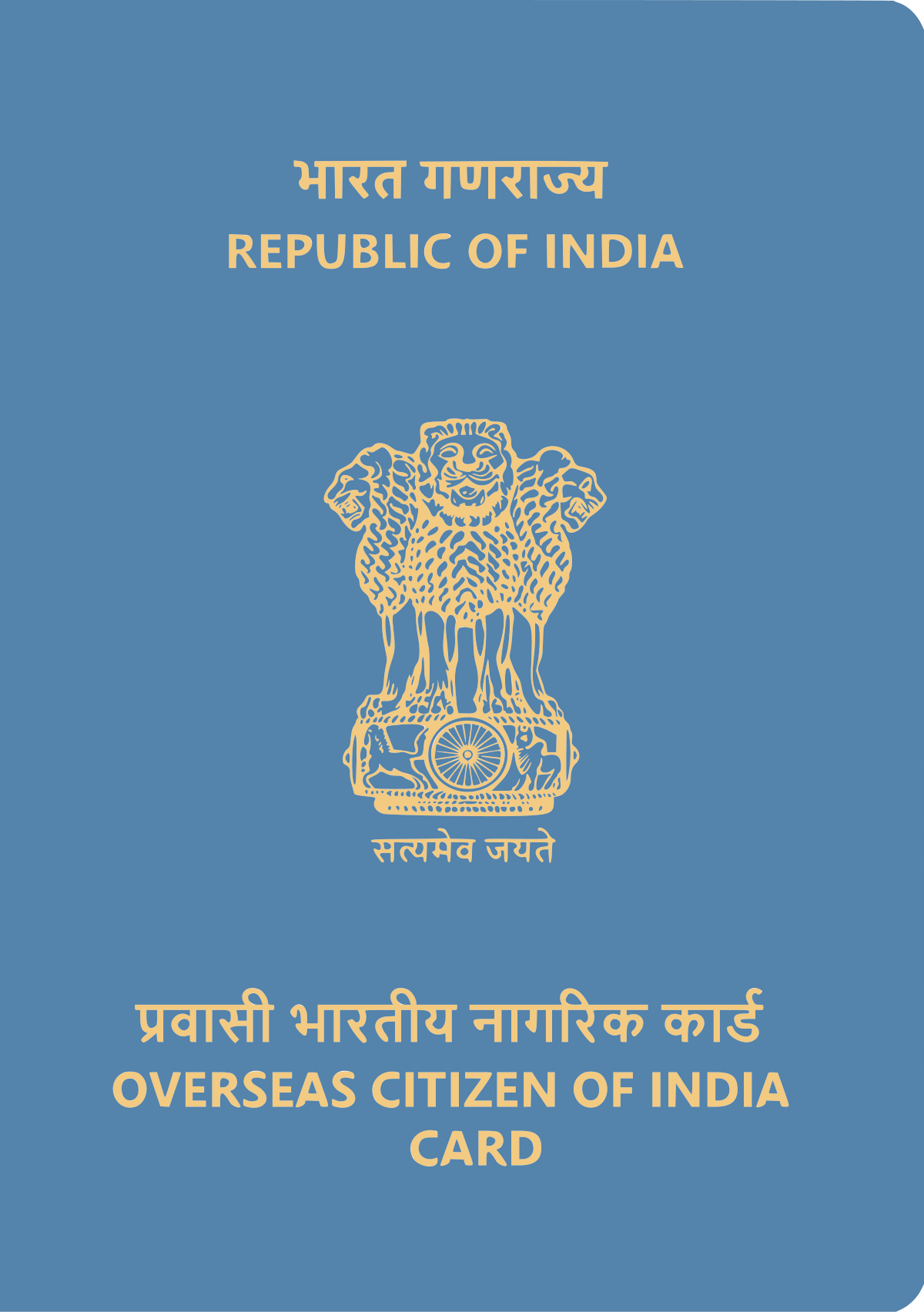 OCI CARD
OCI CARD
Background
- The Government of India established a High Level Committee on the Indian Diaspora in September 2000, chaired by L.M. Singhvi.
- The Committee's mandate was to conduct a comprehensive study of the global Indian Diaspora and to recommend measures to foster a positive relationship with them.
- The committee's report was due in January 2002.
- It proposed amending the Citizenship Act (1955) to allow for the grant of dual citizenship to Persons of Indian Origin (PIOs) from certain countries.
- As a result, the Citizenship (Amendment) Act, 2003, provided for the acquisition of Overseas Citizenship of India (OCI) by PIOs from 16 specified countries other than Pakistan and Bangladesh.
- It also removed from the Principal Act all provisions recognising or relating to Commonwealth Citizenship.
- Later, the Citizenship (Amendment) Act of 2005 broadened the scope of OCI grant to PIOs from all countries except Pakistan and Bangladesh, as long as their home countries allow dual citizenship under local law.
- It should be noted that the OCI is not a dual citizenship because the Indian Constitution prohibits dual citizenship or dual nationality (Article 9).
- Again, the Citizenship (Amendment) Act, 2015, modified the provisions of the Principal Act pertaining to OCI.
- By combining the PIO card scheme and the OCI card scheme, it has created a new scheme called "Overseas Citizen of India Cardholder."
- The PIO card scheme was implemented on August 19, 2002, and the OCI card scheme was implemented on December 2, 2005.
- Despite the fact that the OCI card scheme had become more popular, both schemes were running concurrently. This was causing applicants unnecessary confusion.
- Keeping in mind some of the issues that applicants were experiencing, the Government of India decided to create a single scheme by combining the PIO and OCI schemes.
- As a result, the Citizenship (Amendment) Act, 2015, was enacted to achieve this goal.
- The PIO scheme was cancelled on January 9, 2015, and it was also announced that all existing PIO card holders would be considered OCI card holders as of that date.
Action
- Citizenship (Amendment) Act of 2003.
- Made provisions for acquisition of OCI by PlOs of 16 countries (not including Bangladesh and Pakistan)
- Omitted all provisions relating to & recognizing Commonwealth Citizenship from the principle Act
Concept of Overseas Citizenship of India
- An Overseas Citizen of India (OCI) is a person who is technically a citizen of another country but whose ancestors are Indian.
- They were citizens of India on January 26, 1950, or later, unless they are or were citizens of Pakistan, Bangladesh, or suchother country.
- Registered Overseas Citizens of India are granted multi-purpose and life-long visas for visits to India.
- They are also exempt from registration with the Foreign Regional Registration Officer or the Foreign Registration Officer for any length of stay in India.
Important Provisions
I. OCI - Registration
- The Central Government may register as an overseas citizen of India cardholder:
- any person of full age and capacity,
- who is a citizen of another country, but was a citizen of India at the time of, or at any time after, the commencement of the Constitution;
- who is a citizen of another country, but was eligible to become a citizen of India at the time of, or at any time after, the commencement of the Constitution; or
- who is a citizen of another country but was born in a territory that became a part of India after August 15, 1947; or
- a person who is a minor child of a person mentioned in clause (a); or
- a person who is a minor child and whose both parents are citizens of India or one of the parents is a citizen of India; or
- spouse of a citizen of India or spouse of an Overseas Citizen of India Cardholder, whose marriage has been registered and subsisted for a continuous period of not less than two years immediately preceding the submission of the application.
- any person of full age and capacity,
- No person shall be eligible for registration as an Overseas Citizen of India Cardholder if he or she, or either of his or her parents, grandparents, or great grandparents, is or was a citizen of Pakistan, Bangladesh, or any other country specified by the Central Government.
- The Central Government may specify the date as of which existing persons of Indian origin cardholders will be considered overseas citizens of India cardholders.
- Notwithstanding anything in point (1), the Central Government may, if it is satisfied that special circumstances exist, register a person as an Overseas Citizen of India Cardholder after recording the circumstances in writing.
II. OCI - Conferment of Rights
- An overseas citizen of India cardholder is entitled to the rights specified by the Central Government in this regard.
- A cardholder who is an overseas citizen of India is not entitled to the following rights (which are conferred on a citizen of India)–
- He shall not be entitled to the right to equal opportunity in public employment.
- He is ineligible for election as President.
- He is ineligible for election as Vice President.
- He is ineligible for appointment as a Supreme Court Judge.
- He shall be ineligible for appointment as a High Court Judge.
- He is not eligible for voter registration.
- He shall be ineligible to serve in the House of People or the Council of States.
- He is ineligible to serve in the State Legislative Assembly or the State Legislative Council.
- He shall be ineligible for appointment to public services and posts in connection with Union or State affairs, except in such services and posts as the Central Government may specify.
III. OCI - Renunciation
- If any overseas citizen of India cardholder makes a declaration in the prescribed manner renouncing the card registering him as an overseas citizen of India cardholder.
- the declaration shall be registered by the Central Government, and that person shall cease to be an overseas citizen of India cardholder upon such registration.
- When a person ceases to be an overseas citizen of India cardholder,
- the spouse of that person of foreign origin and each minor child of that person registered as an OCI card holder ceases to be an overseas citizen of India cardholder.
IV. OCI - Cancellation of Registration
The Central Government may cancel a person's registration as an overseas citizen of India cardholder if the Central Government is satisfied that–
- the registration as an overseas citizen of India cardholder was obtained through fraud, false representation, or concealment of any material fact;
- the overseas citizen of India cardholder has shown disaffection towards the Indian Constitution; or
- the overseas citizen of India cardholder unlawfully traded or communicated with an enemy during any war in which India may be engaged;
- the overseas citizen of India cardholder has been sentenced to imprisonment for a term of not less than two years within five years of registration;
- it is necessary to do so in the interests of India's sovereignty and integrity, security, friendly relations with any foreign country, or in the interests of the general public; or
- the marriage of an overseas citizen of India cardholder–
- has been dissolved by a competent court of law or otherwise; or
- has not been dissolved but he has solemnised marriage with any other person during the subsistence of such marriage.
Overseas Citizenship Of India - Significance
- OCI (Overseas Citizenship of India) should not be confused with dual citizenship as it does not grant political rights. OCI cardholders, who are individuals of Indian origin holding foreign passports and not Indian citizens, enjoy certain benefits.
- These include multiple entries into India, a lifelong visa for various purposes, and exemption from registering with the Foreigners Regional Registration Office (FRRO).
- After being registered as an OCI for a period of five years, individuals become eligible to apply for Indian citizenship. OCI cardholders also have access to special immigration counters at Indian international airports. They are permitted to open special bank accounts, purchase non-farm property, exercise ownership rights, and apply for a Permanent Account Number (PAN) card.
- However, it is important to note that foreign nationals in India on a Tourist Visa, Missionary Visa, or Mountaineering Visa are not eligible to apply for OCI. Additionally, to apply for OCI registration in India, the individual must be a regular resident of India.
- In summary, OCI provides certain privileges to individuals of Indian origin holding foreign passports, such as visa benefits, exemption from FRRO registration, and access to special immigration counters. While OCI does not grant political rights, it allows for eligibility to apply for Indian citizenship after a specified period.
- Certain restrictions apply, and the applicant must be a regular resident of India to apply for OCI registration within the country.
Citizenship (Amendment) Act of 2005
- Expanded scope of OCI status to PIOs of all countries except Pakistan and Bangladesh
OCI not actually dual citizenship (prohibited by Article 9 of the Constitution)
Citizenship (Amendment) Act of 2015
- Modified OCI provisions
- Introduced OCI Cardholder Scheme by merging PIO card scheme (introduced 2002) and OCI card scheme (introduced 2005)
- Both had been running parallel, causing confusion
- PIO card scheme rescinded
- All existing PIO card holders deemed OCI cardholders
- Replaced nomenclature of "Overseas Citizens of India" with "Overseas Citizen of Indian Cardholder".
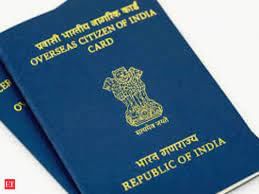 OCI Card
OCI Card
Registration of OCI Cardholder
1. Interested person has to register an application with the Central govt. On receiving the application, the Central govt can register as an OCI Cardholder
(a) Any person of full age and capacity
- Who is a citizen of another country, but was a citizen of India at the time of, or at any time after the commencement of the Constitution.
- Who is a citizen of another country, but was eligible to become a citizen of India at the time of the commencement of the Constitution
- Who is a citizen of another country, but belonged to a territory that became part of India after the 15th August 1947
- Who is a child or grandchild or a great-grandchild of such a citizen
(b) A person, who is a minor child of a person mentioned in clause (a); or
(c) A person, who is a minor child, and whose both parents are citizens of India or one of the parents is a citizen of India; or
(d) Spouse of foreign origin of a citizen of India or spouse of foreign origin of an OCI cardholder and whose marriage has been registered and subsisted for a continuous period of not less than two years immediately preceding the presentation of the application
- No person, who or either of whose parents or grandparents or great grandparents is or had been a citizen of Pakistan, Bangladesh or such a country as the Central Government may specify, shall be eligible for registration as an OCI Cardholder.
2. The Central Government may specify the date from which the existing persons of Indian Origin Cardholders shall be deemed to be OCI Cardholders (decided on o9-01-2015)
3. Notwithstanding anything contained in point (1), Central Government may, if it is satisfied that special circumstances exist, after recording the circumstances in writing, register a person as an OCI Cardholder.
1. He shall not be entitled to the right to equality of opportunity in matters of public employment.
2. He shall not be eligible for election as President.
3. He shall not be eligible for election as Vice-President.
4. He shall not be eligible for appointment as a Judge of the Supreme Court
Which of these statements is/are correct?
Conferment of Rights of OCI Cardholders
(i) Entitled to rights as specified by the Central government.
(ii) NOT entitled to the following rights:
- Right to equality of opportunity in matters of public employment
- Not eligible for election as President, Vice-President, member of Parliament or State Legislative Assembly or State legislative Council.
- Not eligible for appointment as Judge of SC or HCs, or appoints to public services and posts in connection with affairs of the Union or of any state except when specified by the Central Government
- Not to be entitled to registration as a voter
Benefits of OCI Cardholders
- Multiple entry lifelong visa for visiting India for any purpose
But will need special permission to undertake research work - Exemption from registration with Foreigners Regional Registration Officer (FRRO) or Foreigners Registration Officer (FRO) for any length of stay in India.
- Parity with NRIs in respect of all facilities available to them in economic, financial and educational fields except in matters relating to the acquisition of agricultural or plantation properties
- NRIs have all benefits available to Indian citizens subject to notifications issued by the Government from time to time
- Charged same entry fee as domestic Indian visitors to visit national parks and wildlife sanctuaries in India
Renunciation of OCI Card
- OCI cardholder can make a declaration in the prescribed manner to renounce the card and her registration as a Cardholder
- The spouse of foreign origin of a such a person will also cease to be an OCI Cardholder
- Minor children of such a person will also cease to be an OCI Cardholder
Cancellation of OCI Card
Central Government can cancel the OCI Card if it is satisfied that:
- The card was obtained by fraud, false representation or concealment of material fact
- The cardholder has shown disaffection towards the Constitution of India
- The cardholder has unlawfully traded or communicated with an enemy with which India is at war
- Cardholder holder has been sentenced to two or more years of imprisonment within 5 years of obtaining the card
- It is necessary to do so in the interest of sovereignty and integrity of India, the security of India, friendly relations of India with any foreign country, or in the interests of the general public
- The marriage of an OCI has been dissolved by a competent court, or has not been dissolved by the Cardholder has also solemnised another marriage
Table: Comparing NRI, PIO & OCI Cardholder
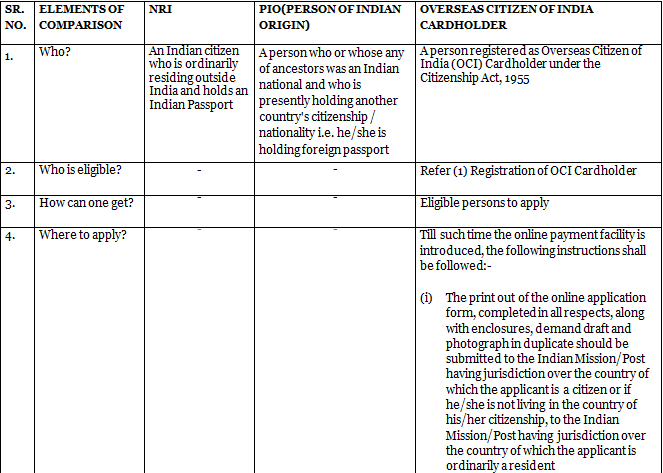
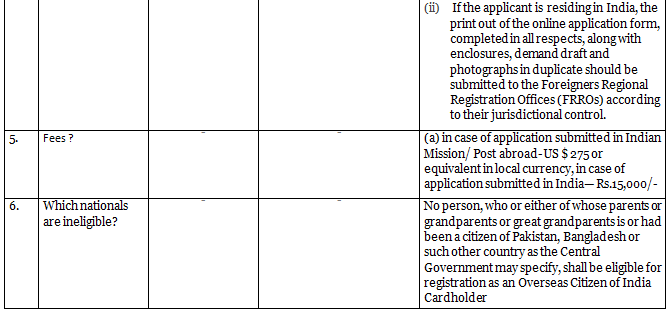
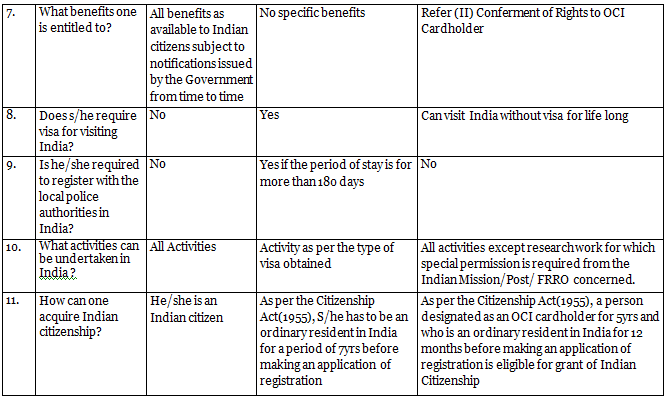
1. The Citizenship (Amendment) Act, 2005, expanded the scope of the grant of OCI for PIOs of all countries except Pakistan and Bangladesh
2. The OCI is not actually dual citizenship as the Indian Constitution forbids dual citizenship or dual nationality
Which of these statements is/are not correct?
Citizenship (Amendment) Bill 2019
The amendment proposes to permit members of six communities - Hindus, Sikhs, Buddhists, Jains, Parsis and Christians from Pakistan, Bangladesh and Afghanistan - to continue to live in India if they entered India before December 14, 2014.
- It also reduces the requirement for citizenship from 11 years to just 6 years.
- Two notifications also exempted these migrants from the Passport Act and Foreigners Act.
- A large number of organisations in Assam protested against this Bill as it may grant citizenship to Bangladeshi Hindu illegal migrants.
- The justification given for the bill is that Hindus and Buddhists are minorities in Bangladesh, and fled to India to avoid religious persecution, but Muslims are a majority in Bangladesh and so the same cannot be said about them.
Different Scenario in Assam
- Assam witnessed large-scale illegal migration from erstwhile East Pakistan and, after 1971, from present-day Bangladesh.
- This led to the six-year-long Assam movement from 1979 to 1985, for deporting illegal migrants.
- The All Assam Students' Union (AASU) led the movement that demanded the updating of the NRC and the deportation of all illegal migrants who had entered Assam after 1951.
- The Assam Movement against illegal immigration eventually led to the historic Assam Accord of 1985, signed by the Movement leaders and the Rajiv Gandhi government.
- It set March 25, 1971, as the cut-off date for the deportation of illegal migrants.
- Since the cut-off date prescribed under articles 5 and 6 of the Constitution was July 19, 1949 - to give force to the new date, an amendment was made to the Citizenship Act, 1955, and a new section (6A) was introduced.
Section 6A
- The section was made applicable only to Assam.
- It laid down that all persons of Indian origin who entered Assam before January 1, 1966, and have been ordinary residents will be deemed, Indian citizens.
- Those who came after 1 January 1966 but before March 25, 1971, and have been ordinary residents, will get citizenship at the expiry of 10 years from their detection as a foreigner.
- During this interim period, they will not have the right to vote but can get an Indian passport.
- In Assam Sanmilita Mahasangha (2014) where the constitutionality of the 1986 amendment was challenged (the Mahasangha argues that the cutoff year for Assam should be 1951 instead of 1971), the court referred the matter to the Constitution Bench.
- To examine whether Section 6A is constitutional and valid though it prescribes a different cutoff date for Assam (1971) from the one prescribed in the Constitution for the rest of the country (1949).
- A five-judge Bench of the Supreme Court is yet to examine the constitutionality of Section 6A under which the current NRC has been prepared.
|
366 videos|701 docs|149 tests
|

















